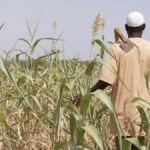
Civil Society Legislative Advocacy Centre (CISLAC), in partnership with, the National Assembly, Nigerian Economic Summit Group (NESG), Global Alliance for Improved Nutrition (GAIN) and Third-party Advocacy Campaign (TPAC), has expressed the need to intensify efforts at bolstering food security in Nigeria.
Speaking at a two-day National Assembly retreat on food fortification, workforce nutrition and food systems transformation in Nigeria, the Executive Director of CISLAC, Auwal Ibrahim Rafsanjani, pointed out that millions of Nigerians were experiencing food insecurity and malnutrition, especially among children and vulnerable groups, noting that the situation required coordinated efforts, guided by thorough policy dialogues and swift actions.
According to him, economic progress and the overall health of the nation must have effective plans in place to guarantee that working individuals and families can access healthy food. He added that strategies to ensure access to nutritious food for working individuals and families are vital for economic growth and national well-being.
“In 2023, the Global Hunger Index ranked Nigeria 109th out of 125 countries, indicating serious hunger levels. An estimated 26.5 million Nigerians are projected to face acute hunger in 2024, a stark increase from previous years. A resilient and sustainable food system is the cornerstone of food security and can address most of our malnutrition problems,” he said.
Rafsanjani emphasised that long-term progress would depend on investment in infrastructure, support for small-scale farmers, and the promotion of climate-resilient practices, the agricultural landscape, characterised by diverse ecological zones, varied crop systems and multiple stakeholders, including smallholder farmers, traders, and processors.
He added that fluctuating weather patterns, such as erratic rainfall, droughts and floods, pose significant challenges to agricultural output and food security, necessitating the adoption of climate-resilient strategies.
Rafsanjani also noted that violence disrupts farming operations, displaces communities, and limits access to land and resources, particularly affecting food security in the northern regions.
“There is an urgent need to promote biofortification of staple crops, like cassava and sweet potato with essential vitamins to address deficiencies in food,” he said.
Chairman, House Committee on Food and Drug Administration and Control, Regina Akume, emphasised the need for food security through nutritional fortification action in improving the overall health and economic wellbeing of the Nigerian workforce.
She called on stakeholders in food production and supply chain to take lead in investing in research, technology and infrastructure to bolster production and fortification of the country’s staple foods with essential micronutrients.
According to Senior Advisor on Food Security and Nutrition (GAIN), Dr Adeyinka Onabolu, food insecurity is linked to many health and social problems, including malnutrition, difficulties managing diabetes, impaired development in childhood and reduced school performance for children.













